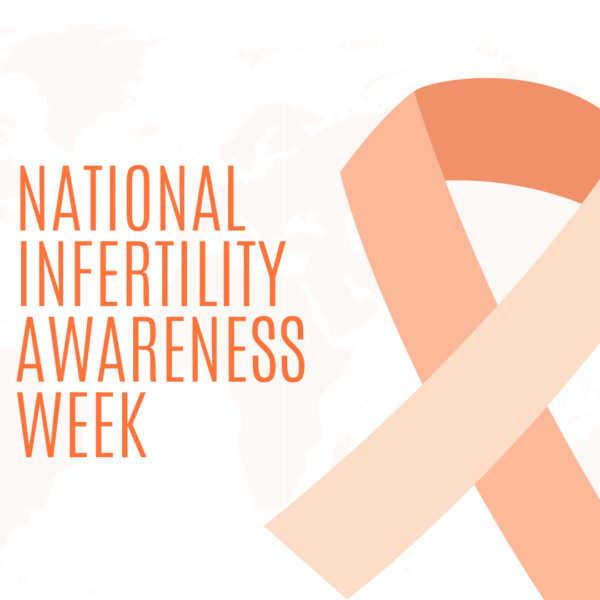To celebrate my 40th birthday, my husband and I went on an extremely memorable trip to Greece in the fall of 2024! This three-part series will outline some of the highlights, insights, and memories from our adventure. It was my favorite vacation thus far!
Day 1: Athens
When the day finally arrived for this bucket list journey to begin, we departed NW Arkansas at 10 a.m., had a few hours of layover in Atlanta, and arrived in Athens at 10:40 a.m. the following day, since they are 8 hours ahead. We were super tired, but also very excited to be there! A kind gentleman drove us from the airport to our hotel, Melia Athens, in the city center. Our hotel was lovely; the best part was the rooftop pool and restaurant! Corey was thrilled they had french fries and ketchup, and I was delighted by the views! One of my favorite parts of traveling is eating, and this trip started so well with a delicious spanakopita salad. It may not look like anything special, but the flavor really was! I just got on Pinterest and pinned this recipe to recreate, which will hopefully be similar.
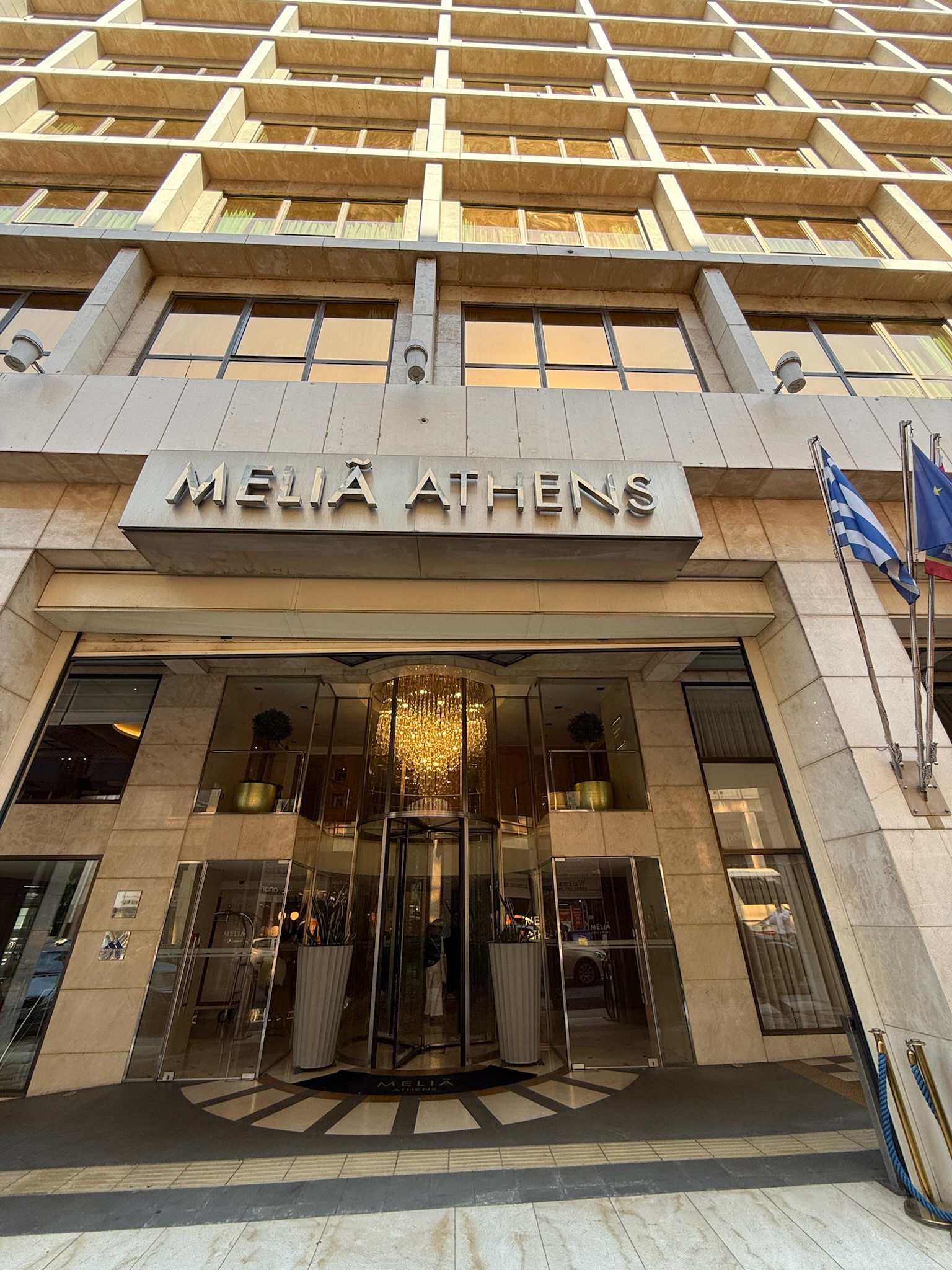
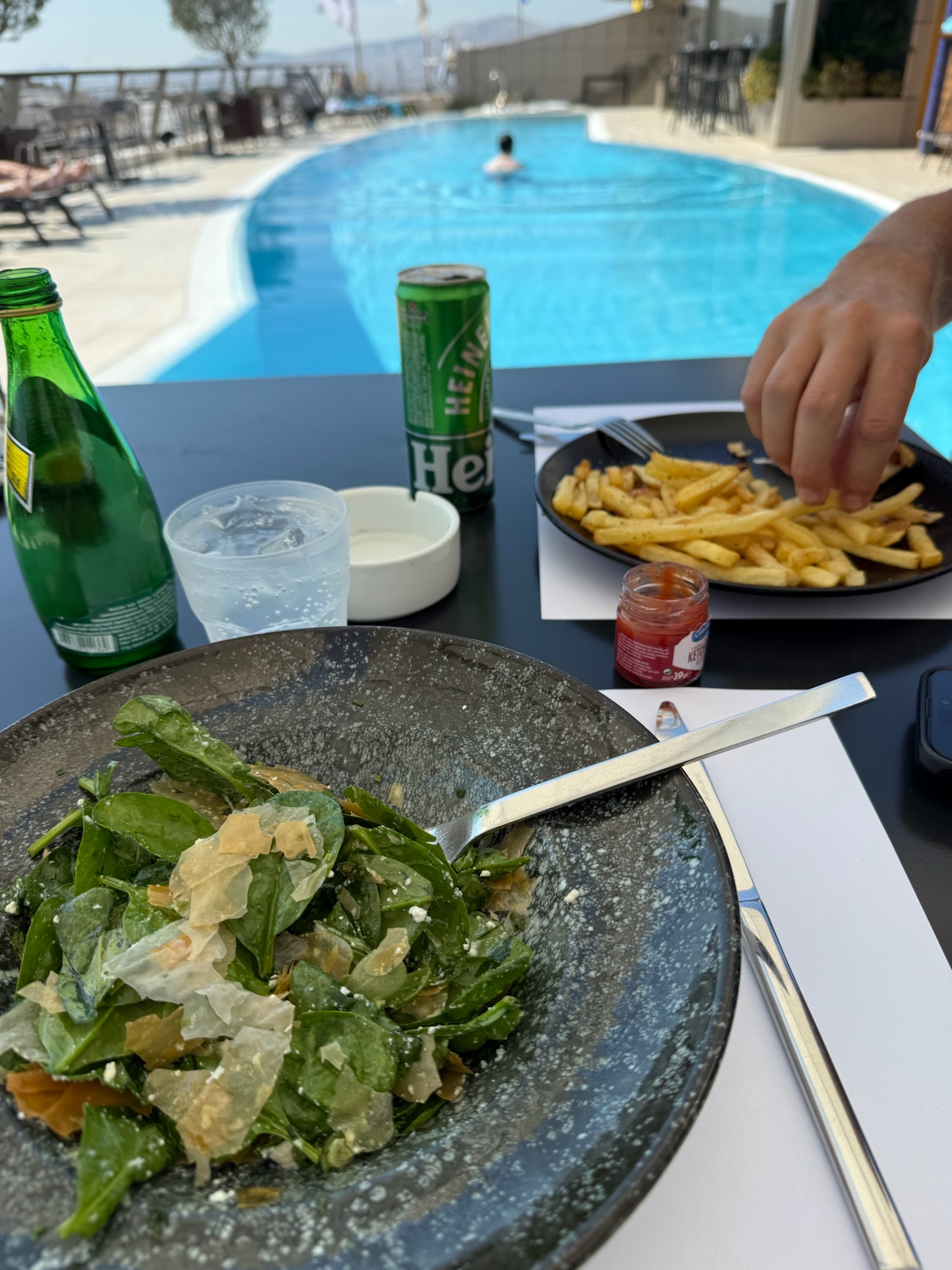
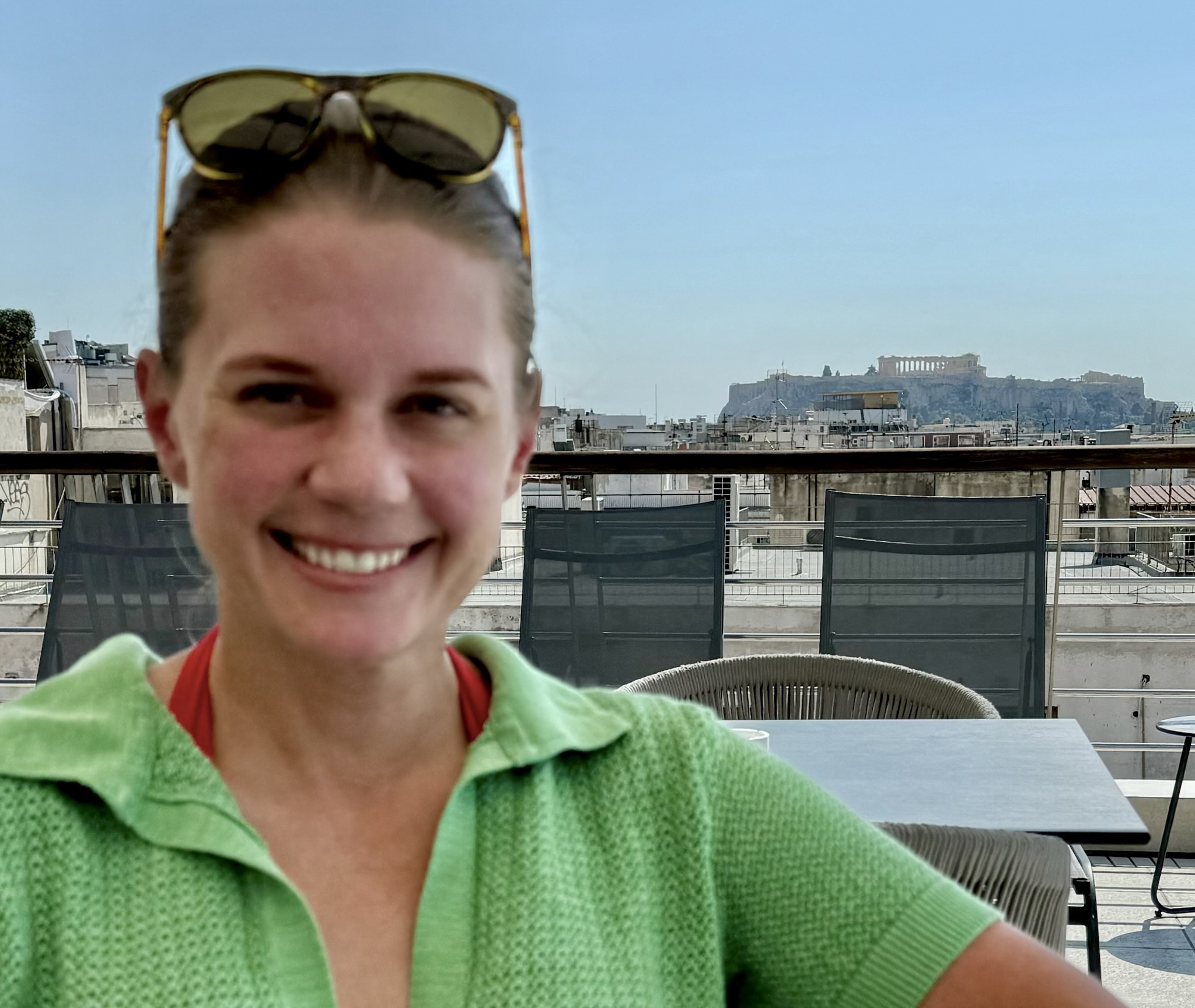
After enjoying our lunch, the adrenaline began to wear off, so we went back to our room and crashed for a few hours. Then we got ourselves ready and took a long walk down the fascinating Aiolou Road in Athens, where we were suddenly immersed in the culture! It was almost overwhelming trying to take it all in: the outdoor venues full of people, the ancient ruins on almost every block, the ground beneath our feet made of beautiful marble with unique designs, the shops, magnificent churches, cats everywhere, music, and laughter. You can click play on the video below to get a sense of it for yourself!
The road ends at the Roman Agora (market), part of which is pictured below with the Acropolis in the background. The octagonal building is called the Tower of the Winds, which was designed by the Greek astronomer Andronicus of Cyrrhus, probably around 50 BC. It is considered the first meteorological station in the world and was also a clock tower, with a sundial on sunny days and a hydraulic clock on cloudy ones. Pretty interesting stuff!
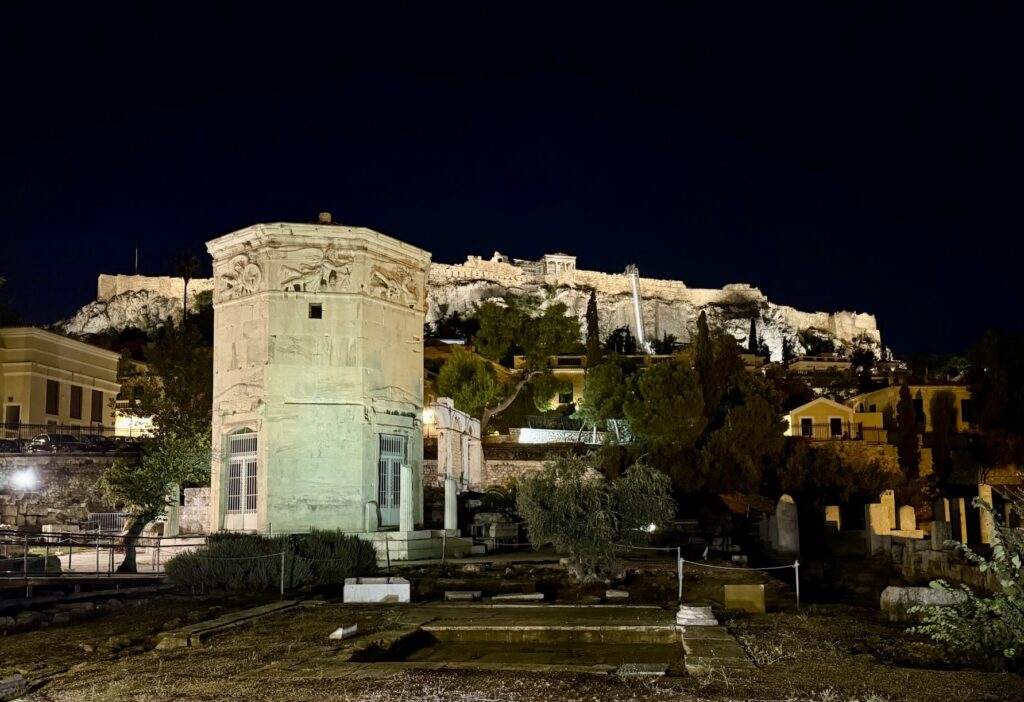
We then continued our way to our destination, a restaurant called “Old Tavern Stamatopoulos” in an area of Athens called Plaka. The atmosphere was incredible; it truly felt like I was in a dream sitting there on that gorgeous evening with my hubby! I could hardly believe I was actually in Greece. We both ordered a glass of red wine and some hummus and pita for an appetizer. For the main meal, Corey ordered moussaka and I ordered grilled octopus. He was a little nervous about his first authentic Greek meal, but he soon discovered how delicious it was! Here is a recipe I’ve made and was happy with, if you’d like to try Moussaka! It is one of our favorites for sure.

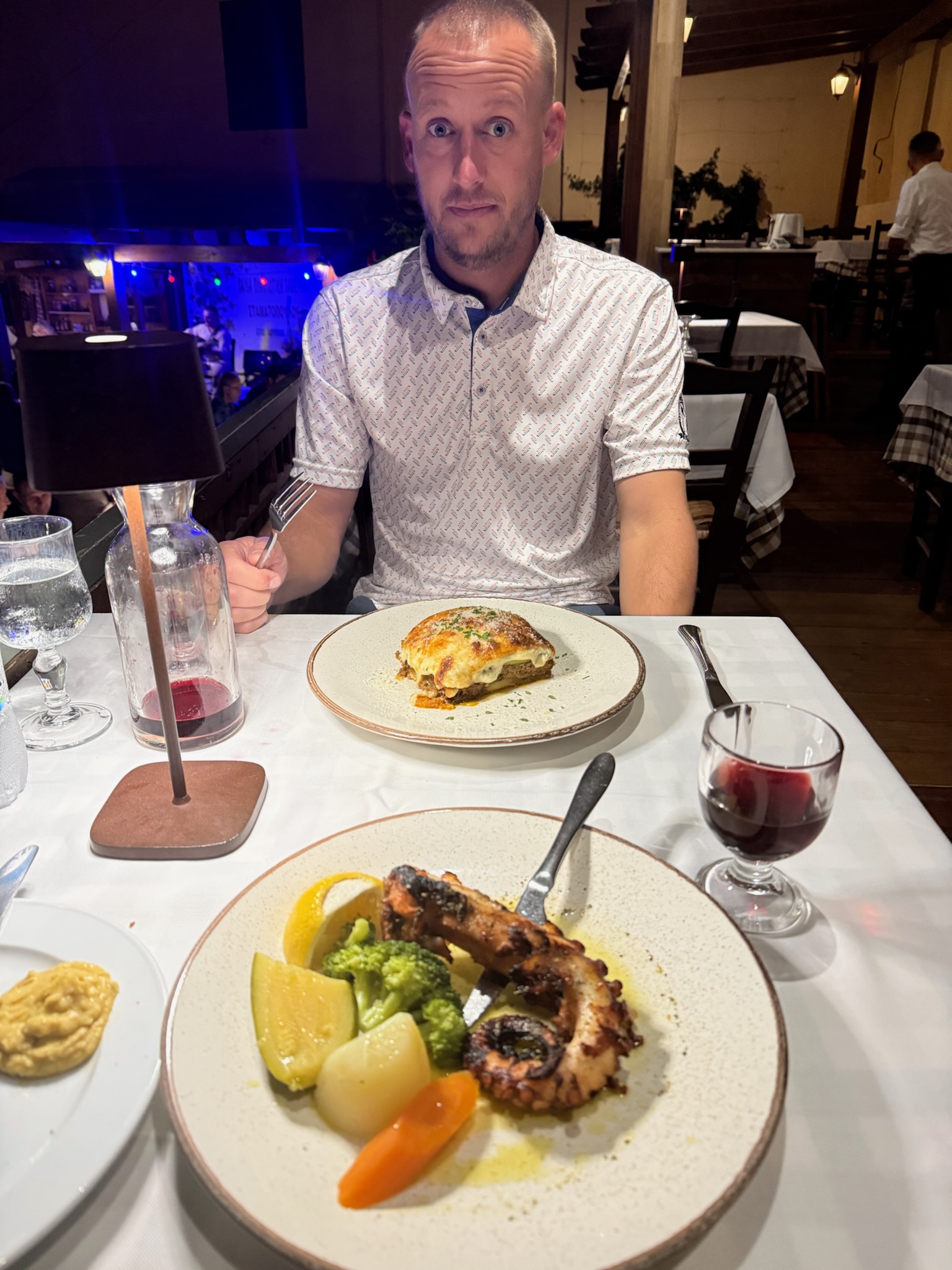
The next day we visited the Areopagus, a large marble rocky outcrop, also known by the Roman name Mars Hill! It is very close to an even larger rock called the Acropolis, where the Parthenon and other temples dedicated to the goddess Athena are located… some of which you can see behind us in the photo. In Greek mythology, the war god, Ares, was supposedly tried here by the other gods for the murder of Poseidon’s son Halirrhothius. It was a prominent meeting place for the elite, philosophers, and the Areopagus council, where discussions and debates of philosophy, religion and law occurred.
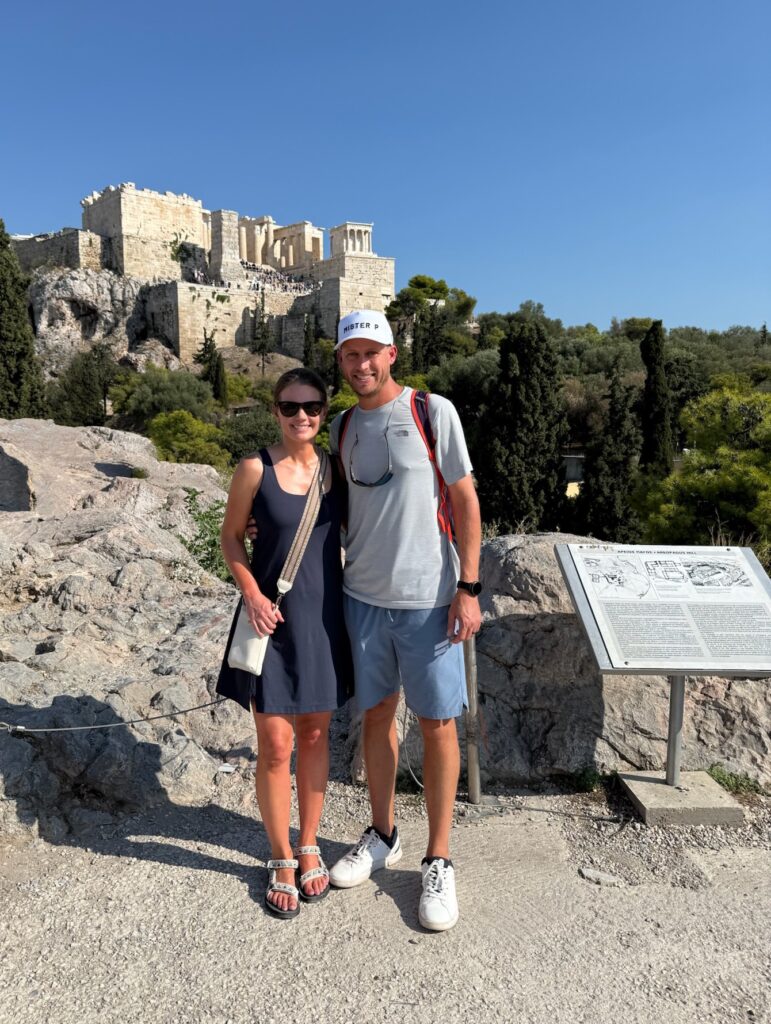
Most importantly to me, the Areopagus is also where the Apostle Paul gave a sermon in Athens on his second missionary journey in 51 A.D., which is recorded in The Book of Acts.
“Now while Paul was waiting for them at Athens, his spirit was provoked within him as he saw that the city was full of idols. So he reasoned in the synagogue with the Jews and the devout persons, and in the marketplace every day with those who happened to be there. Some of the Epicurean and Stoic philosophers also conversed with him. And some said, “What does this babbler wish to say?” Others said, “He seems to be a preacher of foreign divinities”—because he was preaching Jesus and the resurrection. And they took him and brought him to the Areopagus, saying, “May we know what this new teaching is that you are presenting? For you bring some strange things to our ears. We wish to know therefore what these things mean.” Now all the Athenians and the foreigners who lived there would spend their time in nothing except telling or hearing something new…
Try and imagine yourself as one of the people gathered around listening to his words. After all, we are Gentiles, just like them!
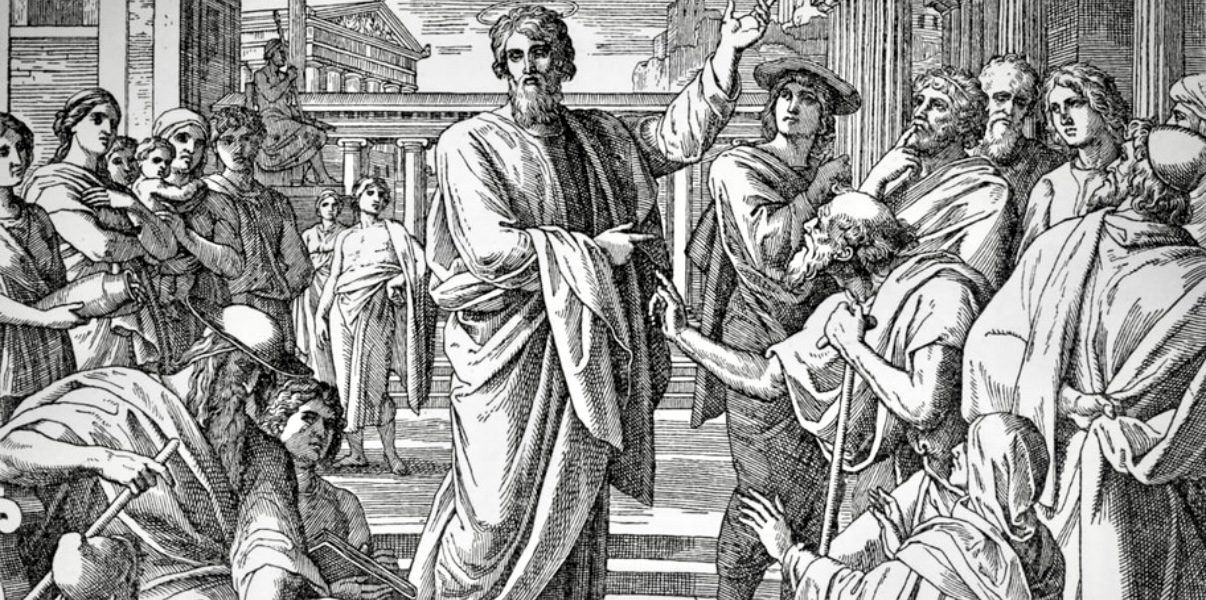
So Paul, standing in the midst of the Areopagus, said: “Men of Athens, I perceive that in every way you are very religious. For as I passed along and observed the objects of your worship, I found also an altar with this inscription: ‘To the unknown god.’ What therefore you worship as unknown, this I proclaim to you. The God who made the world and everything in it, being Lord of heaven and earth, does not live in temples made by man, nor is he served by human hands, as though he needed anything, since he himself gives to all mankind life and breath and everything. And he made from one man every nation of mankind to live on all the face of the earth, having determined allotted periods and the boundaries of their dwelling place, that they should seek God, and perhaps feel their way toward him and find him. Yet he is actually not far from each one of us, for
“‘In him we live and move and have our being’;
as even some of your own poets have said,
“‘For we are indeed his offspring.’
Being then God’s offspring, we ought not to think that the divine being is like gold or silver or stone, an image formed by the art and imagination of man. The times of ignorance God overlooked, but now he commands all people everywhere to repent, because he has fixed a day on which he will judge the world in righteousness by a man whom he has appointed; and of this he has given assurance to all by raising him from the dead.” Now when they heard of the resurrection of the dead, some mocked. But others said, “We will hear you again about this.” So Paul went out from their midst. But some men joined him and believed, among whom also were Dionysius the Areopagite and a woman named Damaris and others with them.”
Acts 17:16-34
The Greeks had many gods, whom they thought each had their own specific strengths and abilities. What Paul is telling them flies in the face of their religion. As J. Vernon McGee says in his Bible commentary about these verses, “He has presented God as Creator in His past work, He shows God as Redeemer in His present work and as the Judge in His future work.”
Aphrodite is not the god of love: The Lord is.
Apollo is not the god of the sun: The Lord is.
Athena is not the god of wisdom: The Lord is.
Poseidon is not the god of the sea: The Lord is.
Zeus is not the god of the sky: The Lord is.
All of us are made to worship, and if the Lord is not the object of our devotion as He is supposed to be, we will find or create other idols to sit on the throne of our lives and our hearts. We are just as guilty of this as the Greeks of antiquity. Paul says there is no excuse for ignorance, and everyone must repent, because we will all be judged by the righteous One who was raised from the dead! It is so powerful reading these words six months after standing there in person, especially having just celebrated Easter! From the text, we know what their response to the resurrection was: some mocked and some believed. What is yours? If you repent and believe, you receive eternal life and the gift of the Holy Spirit! Paul later says in his letter to the Church in Rome:
“If the Spirit of him who raised Jesus from the dead dwells in you, he who raised Christ Jesus from the dead will also give life to your mortal bodies through his Spirit who dwells in you.” Romans 8:11
The SAME Spirit that resurrected Christ dwells in me! Wow, that truth is mind-boggling and landed on me in a new way this Easter. This is true for you, too, if you have believed, repented and received the free gift of salvation!! It brings to mind the lyrics from a song I love by Elevation Worship; “By your Spirit I will rise from the ashes of defeat. The resurrected King is resurrecting me. In your Name I come alive to declare your victory. The resurrected King is resurrecting me!”
Day 2: Corinth
“After these things, Paul departed from Athens and went to Corinth.” Acts 18:1
We did likewise, but he likely walked or traveled by boat, and we went by car. Corinth is 45 miles west of Athens, and on the way, we stopped to see the Corinth Canal, which was begun by Emperor Nero in 67 A.D., but was finally completed in 1893. This canal connects the Aegean and Ionian Seas and is a big shortcut for a lot of seafarers! But before it was a waterway, it was one of the earliest known railways in recorded history, called “The Diolkos,” built around 600 B.C. Rather than a dangerous 250-mile cruise around land by boat, many captains chose to take their ships overland on this paved track with rollers! It was quite the marvel of engineering. Some of the track is still visible to this day.
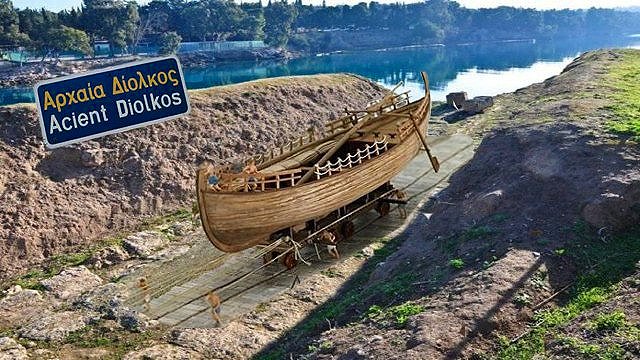

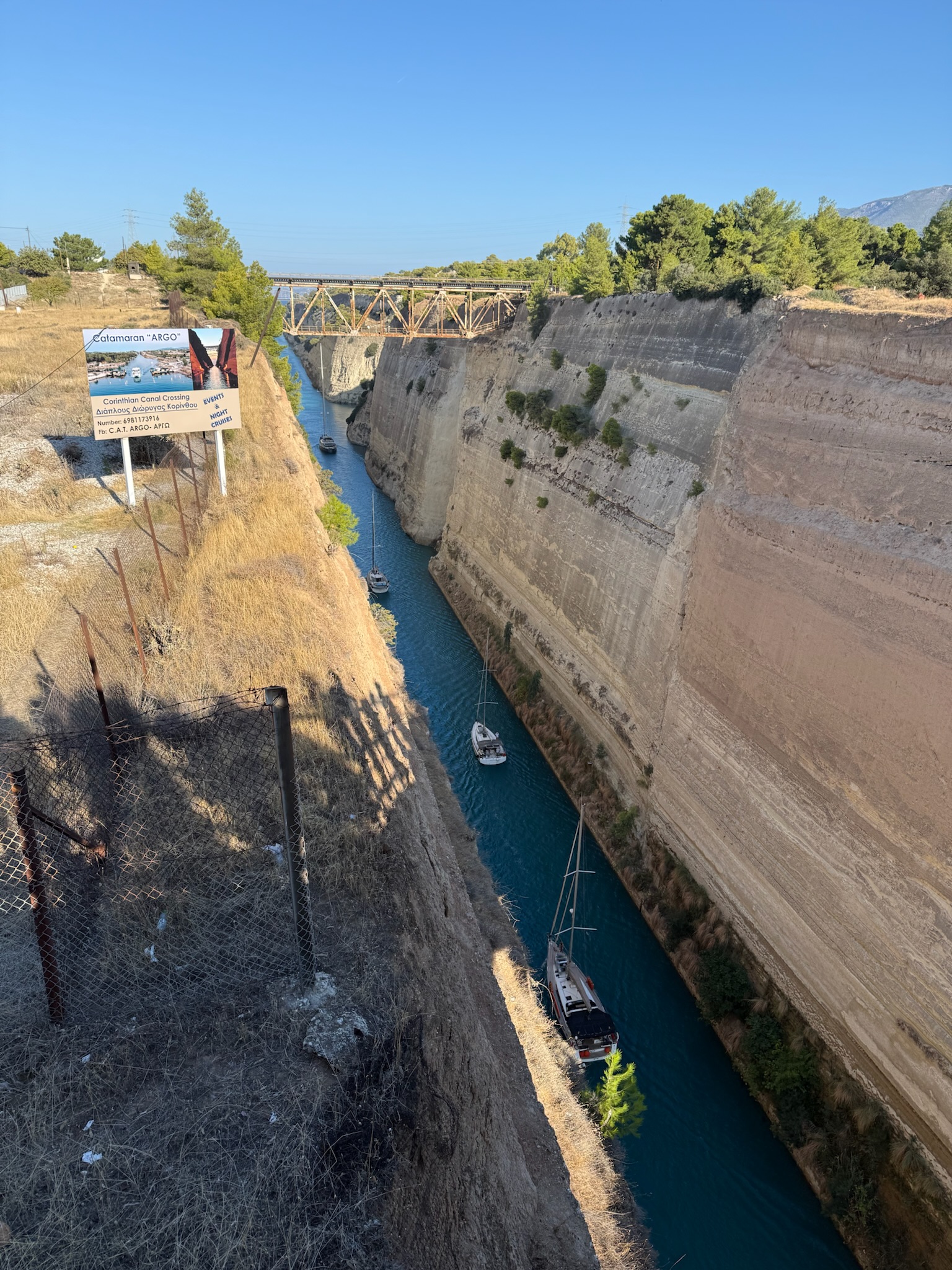
Another interesting historical fact about Corinth is that the city was known for hosting “The Isthmian Games,” which was the second most popular athletic event of the day, next to The Olympics. Some of the games included chariot racing, wrestling, boxing, horse racing, running, discus, long-hump and javelin.
Our next stop was at the eastern port of Corinth a.k.a. Cenchreae, where the Apostle Paul left the city (Acts 18:18) and possibly entered it as well!
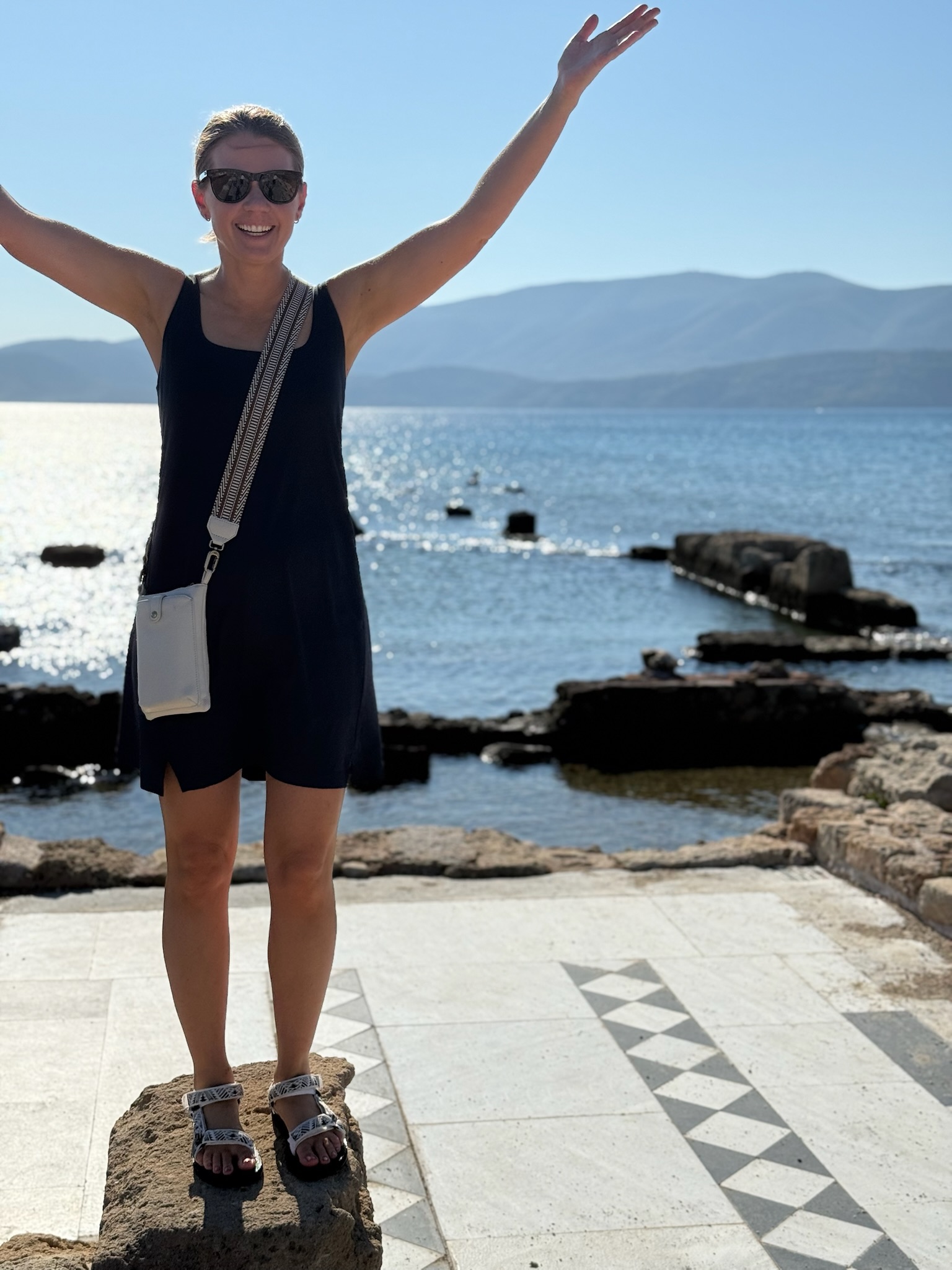
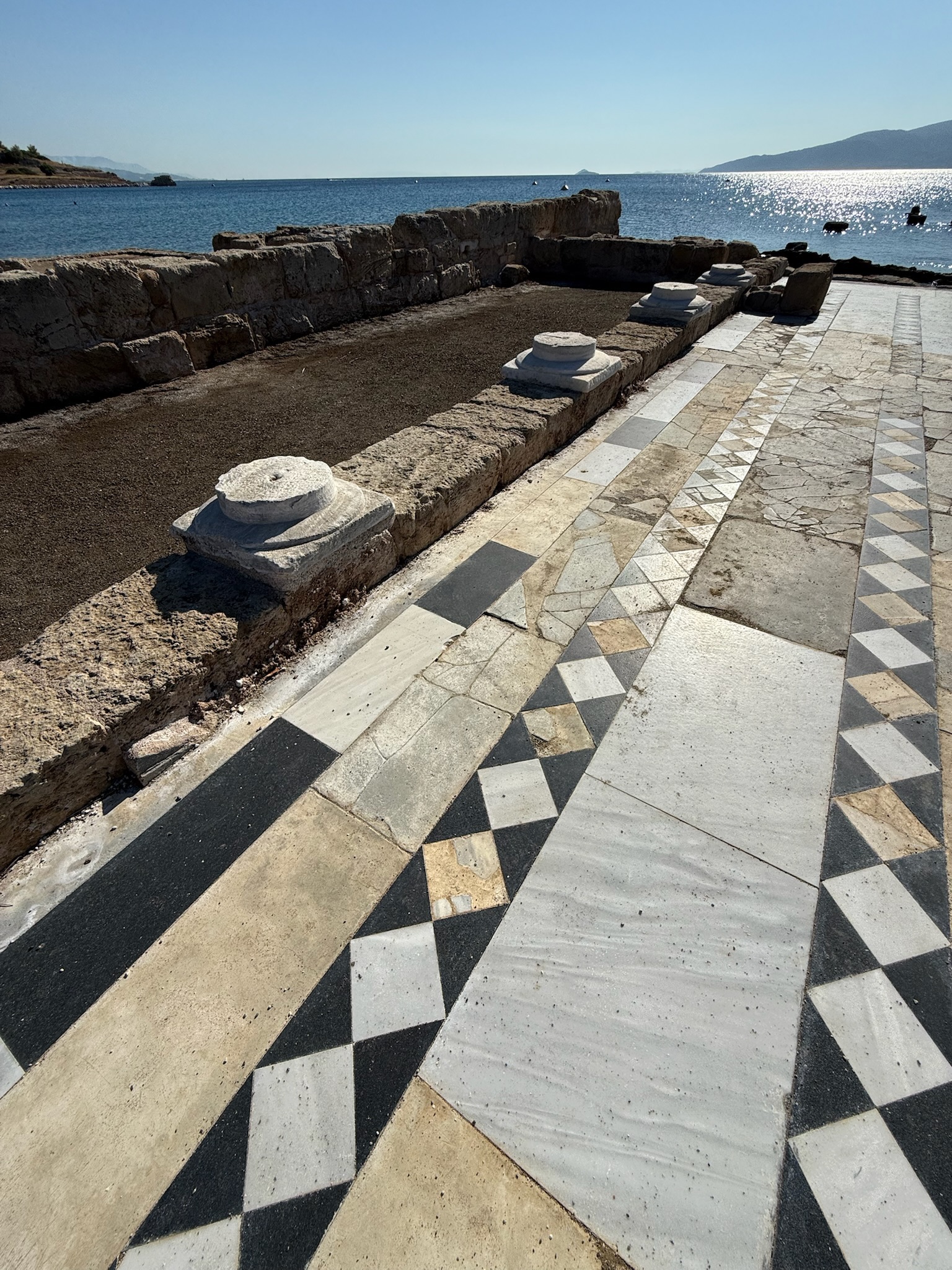
After visiting the port, we got back in the car and drove 7 miles into the town of Corinth. I snapped this photo on the way of this neat sign and a pomegranate tree!
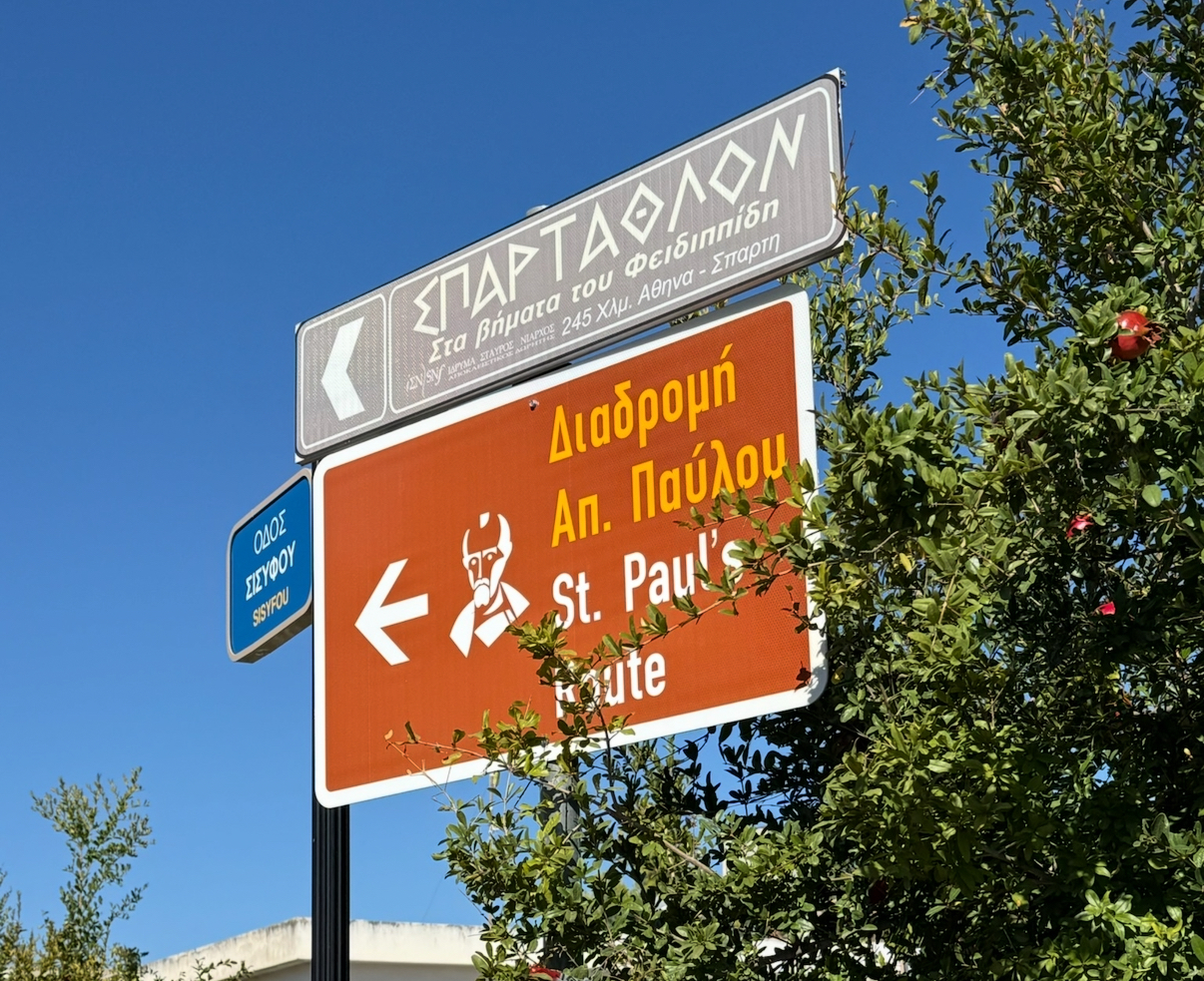
Our first stop in was at the “Church of the Panagia,” a Greek Orthodox Church next to the ruins of ancient Corinth. The words on this stone are from one of the most well-known passages of Scripture, often read at weddings. The apostle Paul wrote them from Ephesus to his beloved Corinthian Church family, after he had left them and before he returned again. The context is not specifically for husbands and wives, but he addresses the attitude necessary among believers and in the church as a whole!
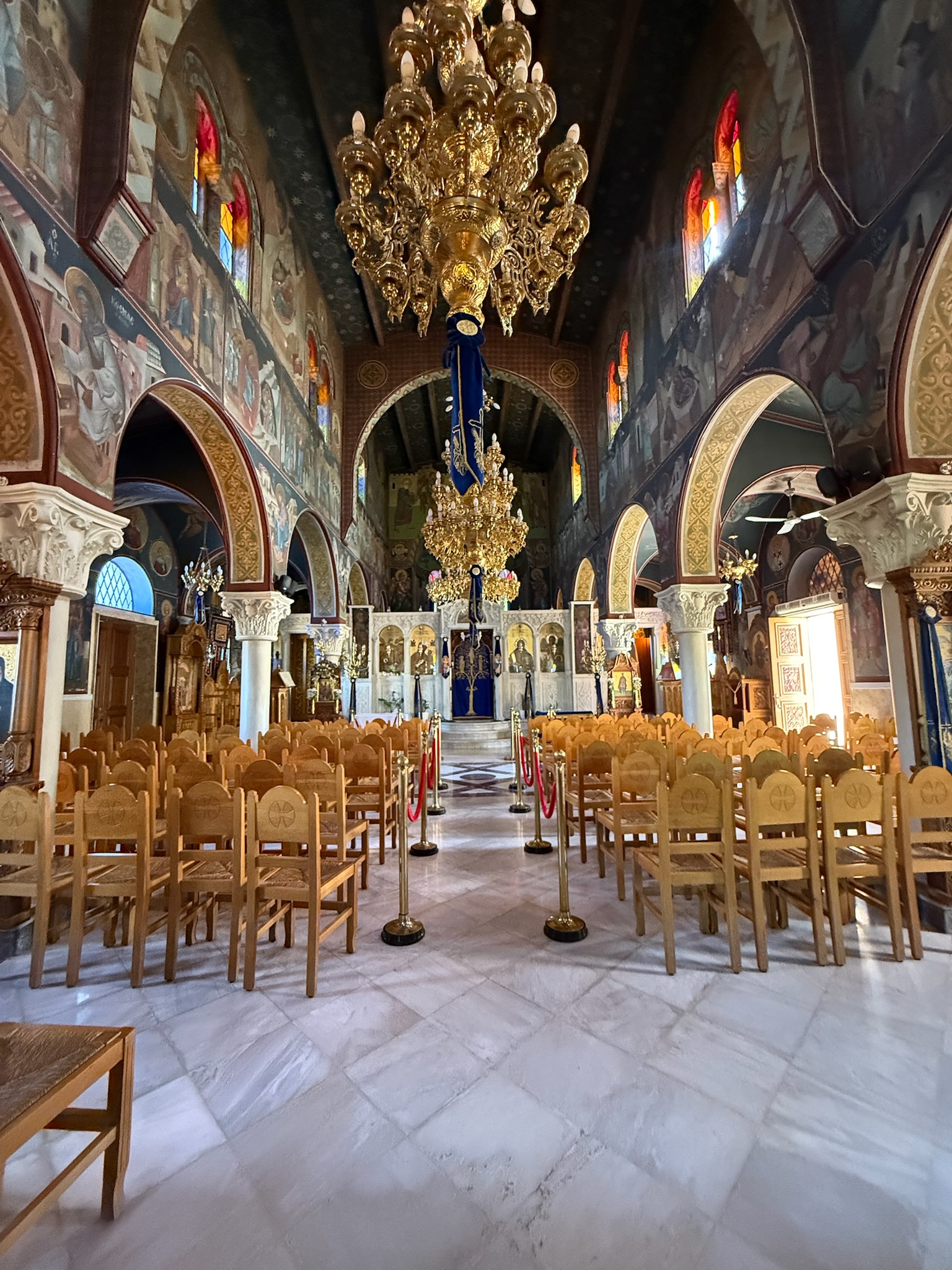
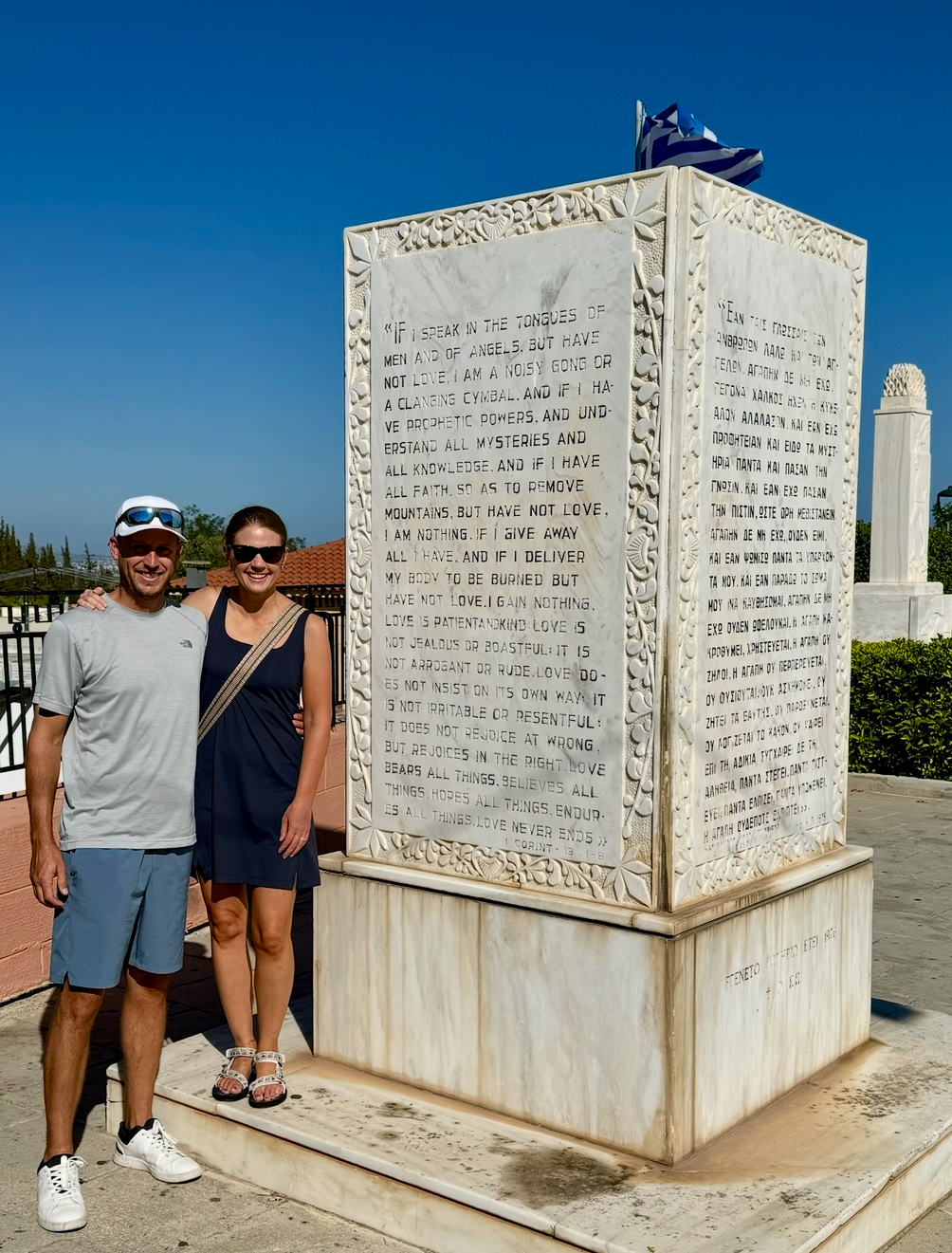
Due to its location, Corinth was a major trade city and a prosperous commercial center. “Carnal Corinth,” as it was known, was also the sin center of the Roman Empire in Paul’s day, like Las Vegas for us. It was so morally corrupt even by pagan standards that to “Corinthianize” came to represent gross immorality and drunken debauchery. Like most cities, they had an outdoor theater for entertainment, including: dramatic plays, musical events and gladiatorial contests. On the Acropolis (high city) was the temple of Aphrodite, where “sacred” prostitution was a form of worship. She was considered the goddess of love, so Paul had his work cut out for him trying to teach them about God’s love and the love we are to have with one another. Give a whole new depth of meaning to those verses above, doesn’t it? We saw the castle that surrounded the temple, but there is no trace left of the temple itself. In the photos, you can see it from Corinth looking up and from the Acropolis looking down.
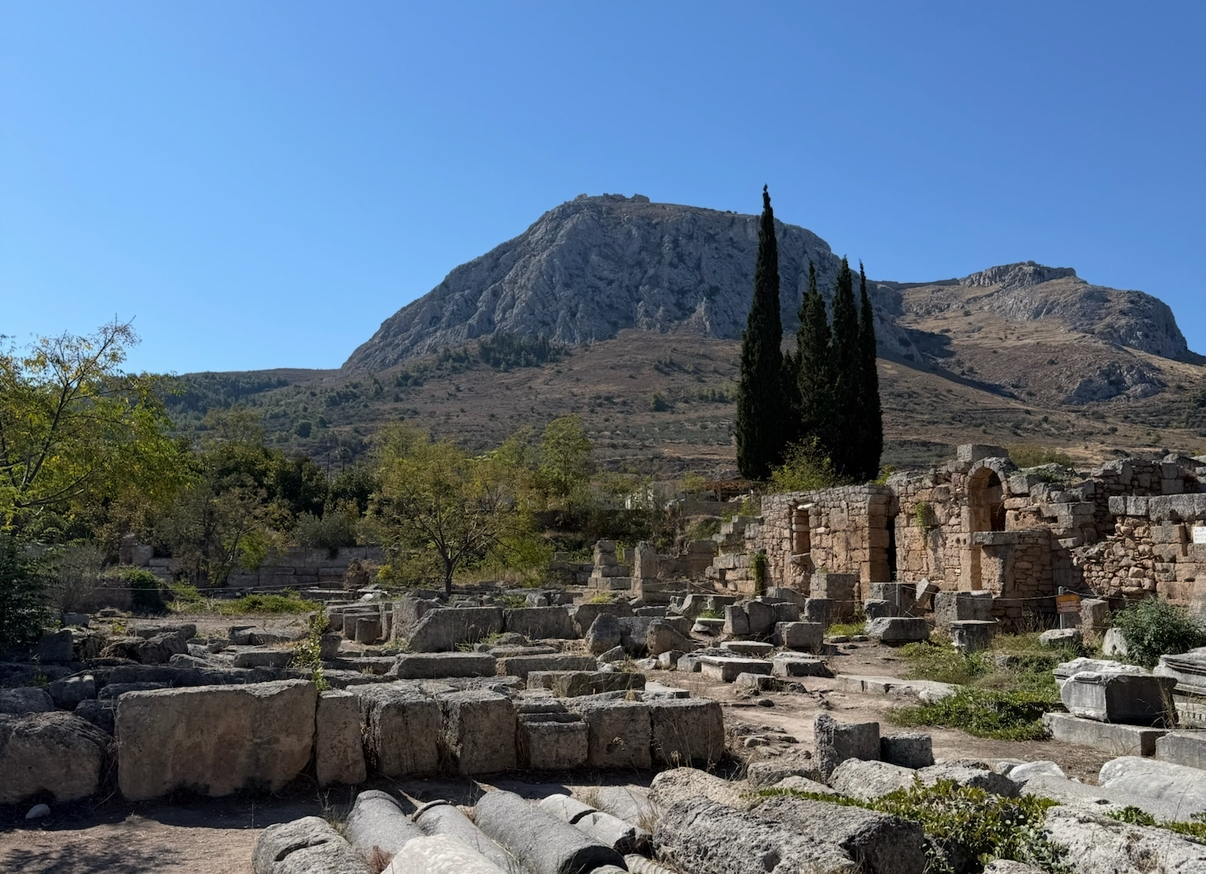

The other major pagan temple in ancient Corinth was the temple of Apollo. In Greek mythology, he was considered the god of the sun and the arts: music, dance & poetry.
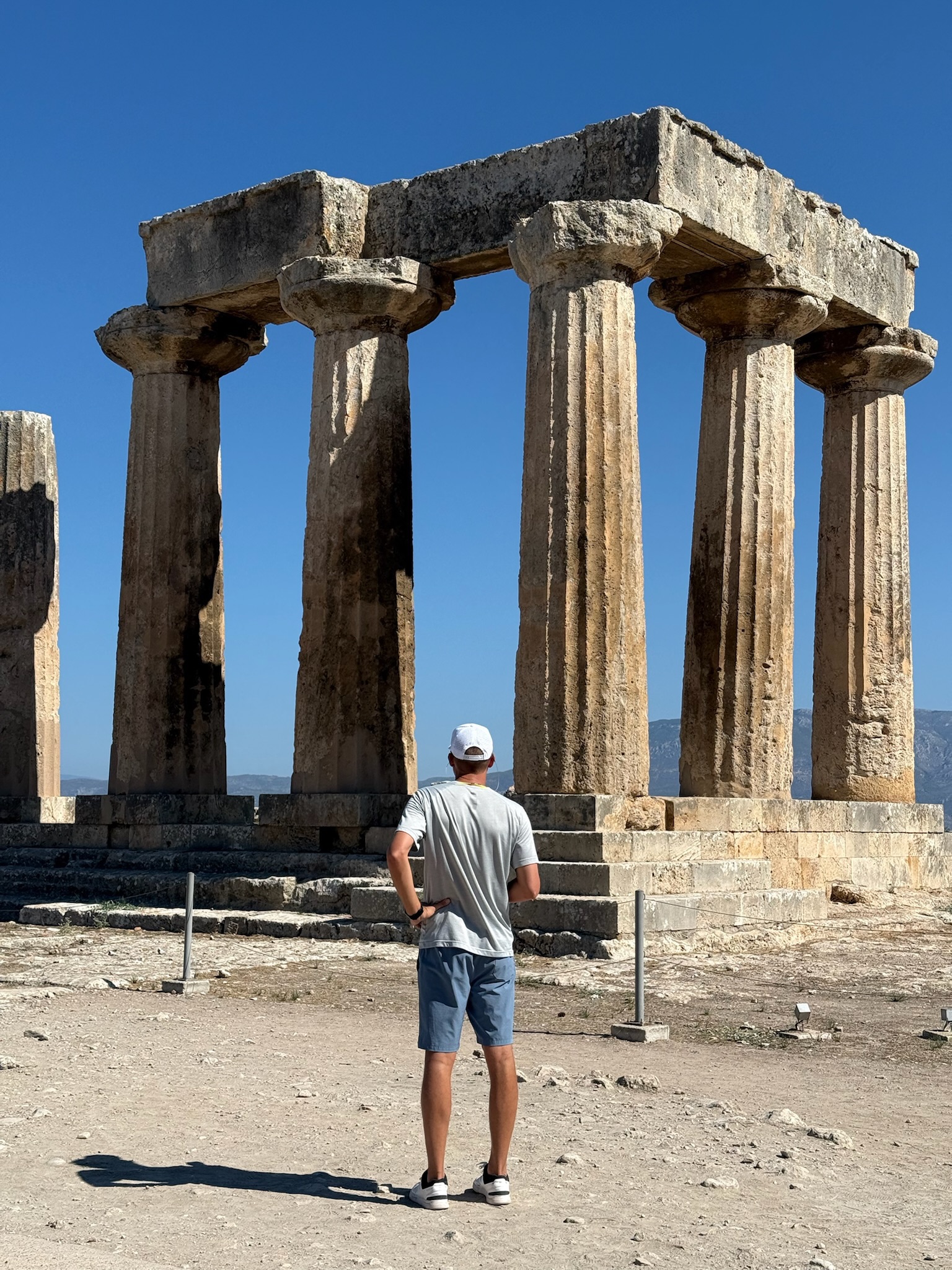
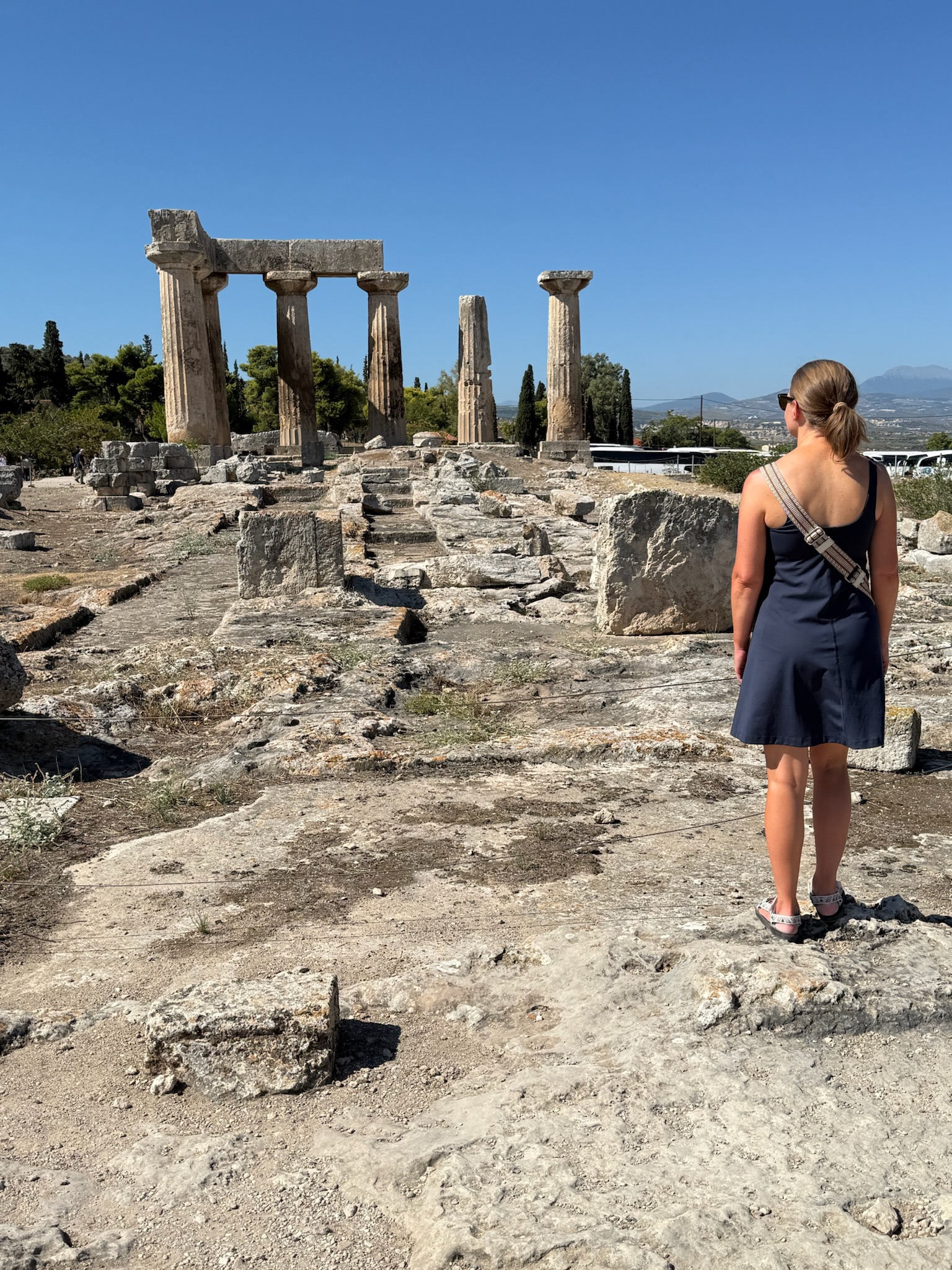
We know from the Bible that there was also a Jewish community in Corinth. Paul befriended a Jewish couple named Aquila and Priscilla. Since they were all three tentmakers, he ended up living and working with them.
“And he reasoned in the synagogue every Sabbath, and tried to persuade Jews and Greeks.”
Acts 18:4
“Crispus, the ruler of the synagogue, believed in the Lord, together with his entire household. And many of the Corinthians hearing Paul believed and were baptized.”
Acts 18:8
As is always the case when the gospel is preached, some believed and some did not. A number of the Jews opposed him so much that they put him on trial!
“When Gallio was proconsul of Achaia, the Jews with one accord rose up against Paul and brought him to the judgment seat, saying, “This fellow persuades men to worship God contrary to the law.” Acts 18:12-13
Gallio ended up ruling that this was a matter of Jewish law, not Roman law, and he threw the case out. Paul was not charged with any crimes. One of the most emotional and memorable moments of this whole trip for both Corey and me was standing there on the Bema (judgement seat), where Paul had stood trial for testifying that Jesus is the Christ! It was eye-opening to stand there and truly get what Paul was up against! Sometimes it is easy to read the Scriptures and not understand the context, but this experience brought it to life for us. Paul stood on the Bema with temples to false gods in every direction, sin celebrated and even his own Jewish brothers wanting to have him arrested.
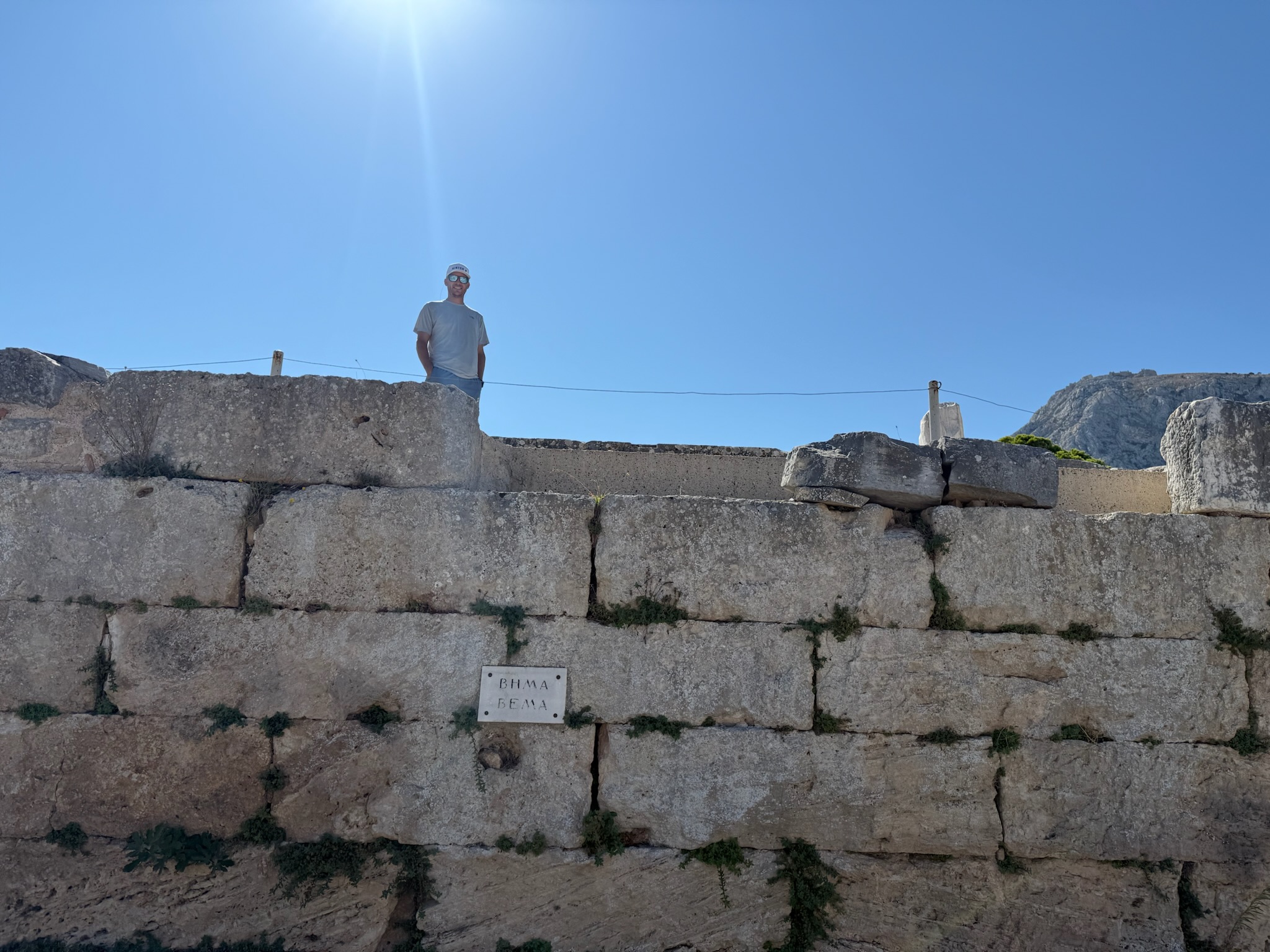
Later, he would write these words in his second letter to the Corinthian church:
“So we do not lose heart. Though our outer self is wasting away, our inner self is being renewed day by day. For this light momentary affliction is preparing for us an eternal weight of glory beyond all comparison, as we look not to the things that are seen but to the things that are unseen. For the things that are seen are transient, but the things that are unseen are eternal.”
2 Corinthians 4:16-18

My eyes filled with tears when I saw this stone on the Bema seat, and they are doing so again now as I type. This week, April 20-26 is “National Infertility Awareness Week.” The past 14 years of infertility have not felt light or momentary at all! At various times, this affliction has threatened to wreck everything: my health, my relationships, my faith and my sanity. But, by the grace of God, do you know what else is being wrecked? My idols, perfectionism, need to control everything, my shame, bitterness, people-pleasing and lack of authenticity. This fiery trial has burned up a lot of junk I was carrying around. My counselor once told me, “you hit your hard early.” And in a way, I’m thankful. Because there are things that have been accomplished in me that I think can only be done in the valley. Do you know what is amazing? I am not in the valley anymore AND I still don’t have children! For a long time, I thought those things were mutually exclusive. But God has shown me that I can have a full, beautiful and purpose-filled life, even with an empty womb. I’ve learned the hard/only way that being fruitful has so much more to do with giving Him glory than giving birth. Infertility grief will always be a part of my life and my story, like a tender scar. I will have to grieve not being able to be a Grandma, too… and so many other things you never really think of. But like Paul (who was also not an earthly parent or grandparent in the physical sense), I believe now with all my heart that the joy of eternity with the Lord will far outweigh any suffering I have or will experience in this world!
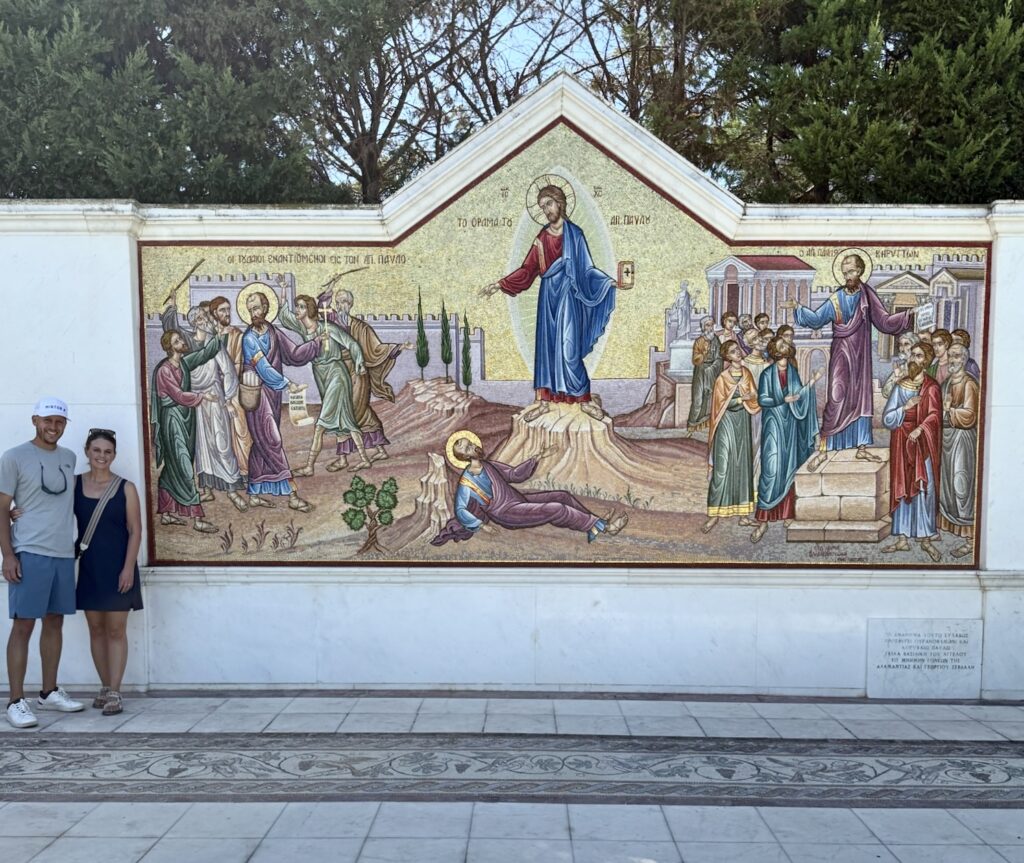
To wrap up our eventful visit to Corinth, we sat and had a relaxing lunch with a view! This time we ordered red wine and chicken souvlaki. Then we went to a little shop to buy some local olive oil before heading back to Athens.
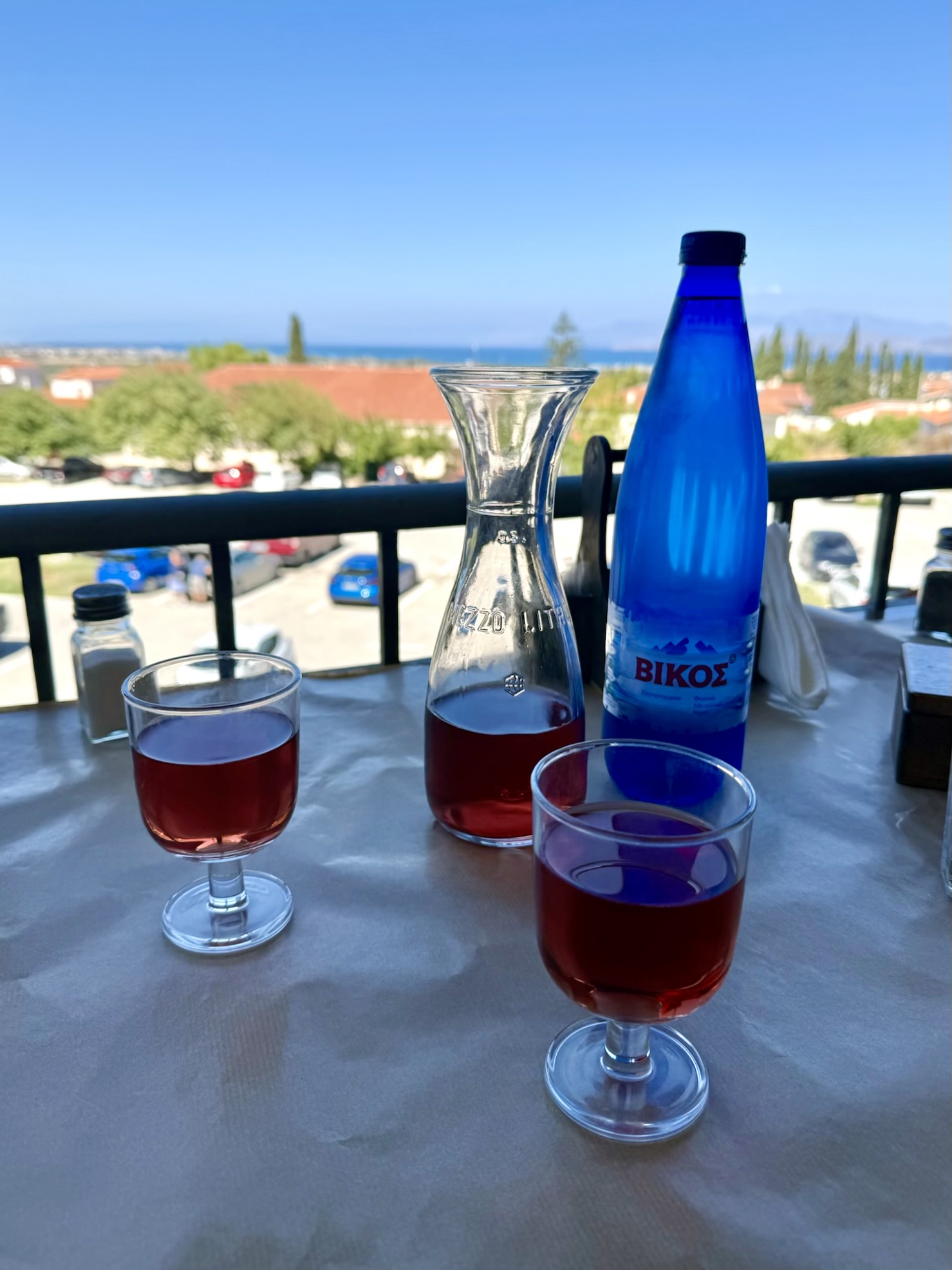
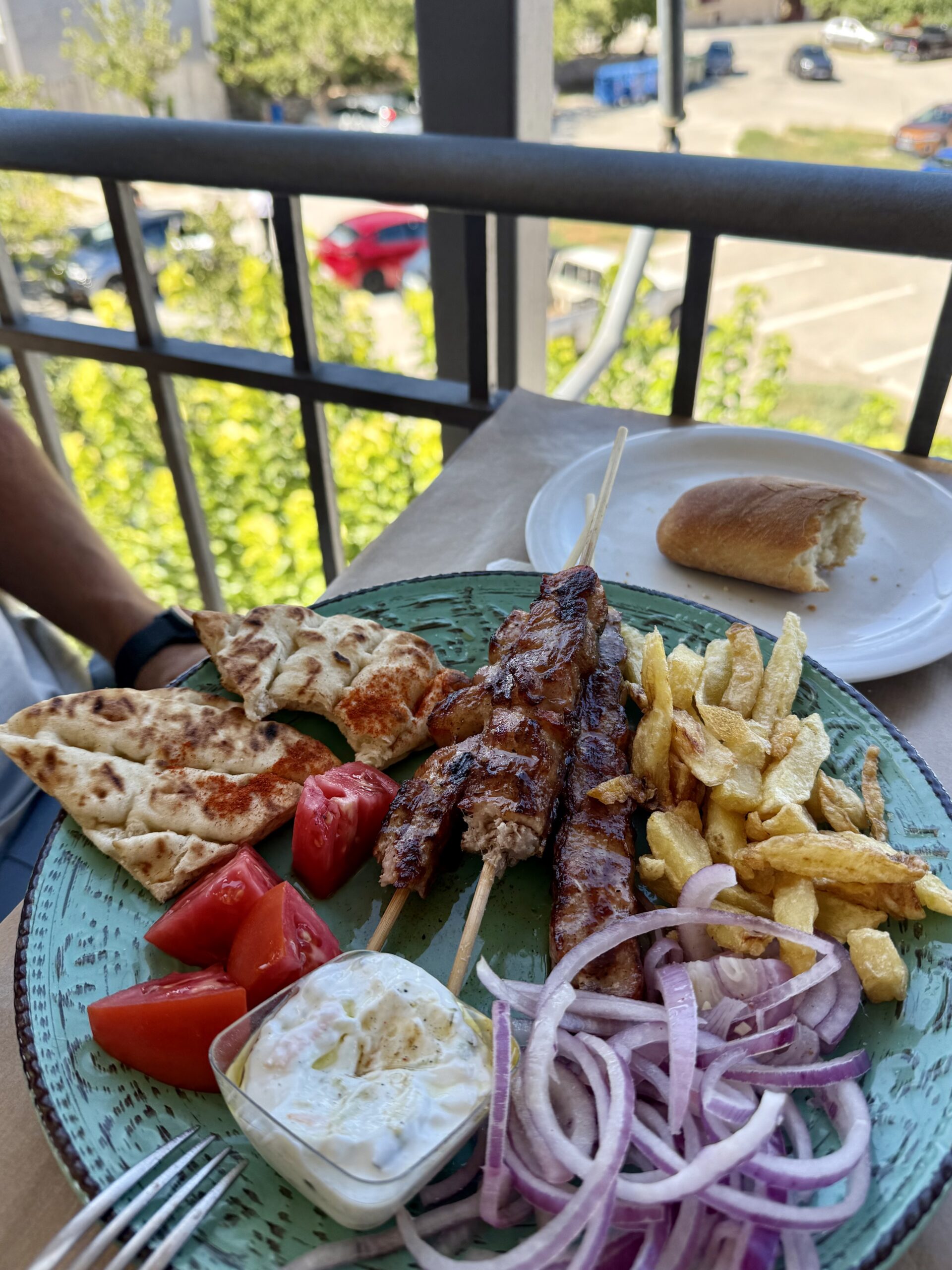
That evening, we walked to a restaurant near our hotel for pasta and Greek salad. Did you know the Greek salad in Greece contains no lettuce? I guess that was an American addition!
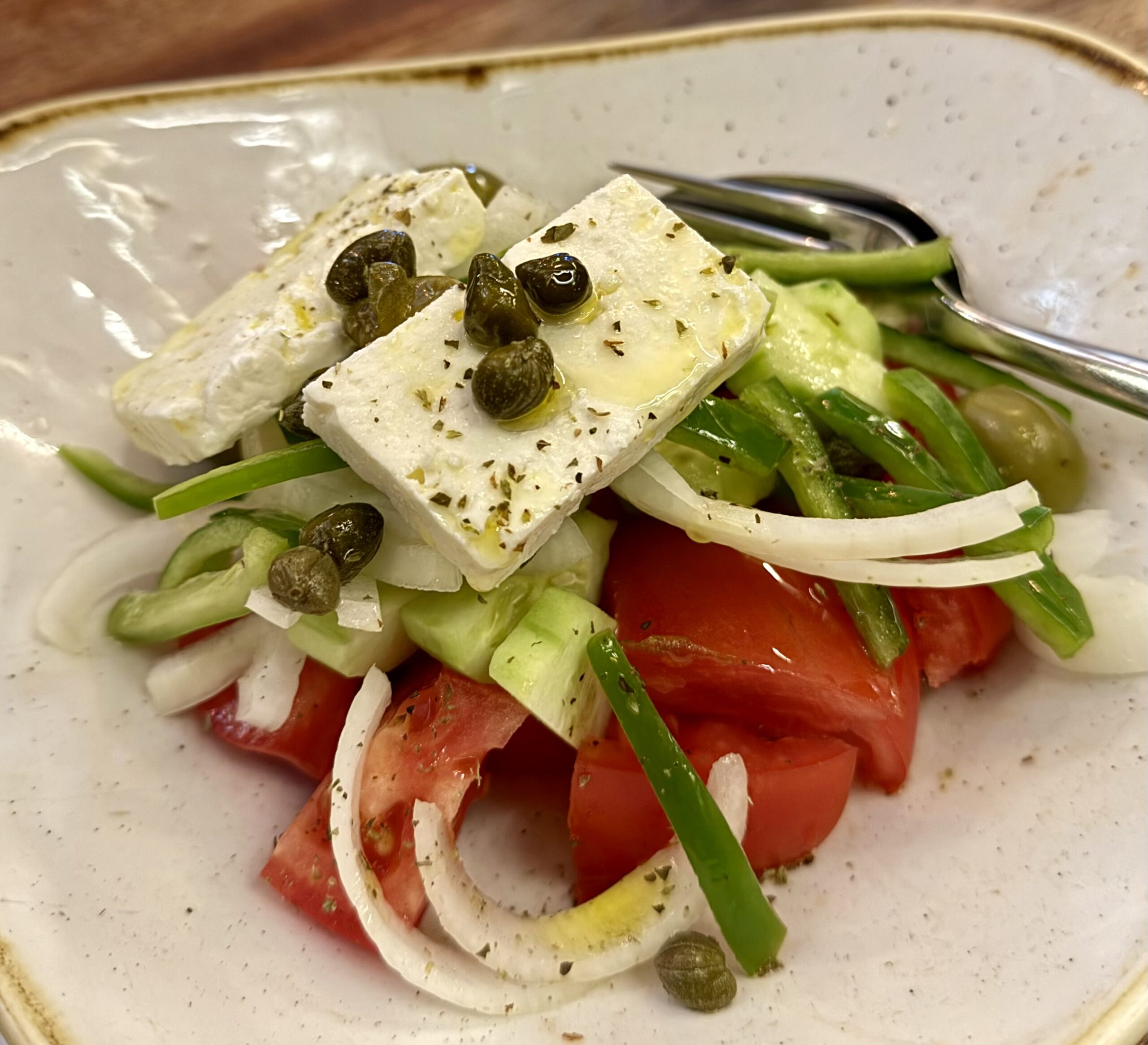
The next day, we boarded our cruise ship and sailed away on the Mediterranean Sea. The remainder of our itinerary included Thessaloniki, Ephesus, and four Greek Islands. More to come on those escapades in future posts!



